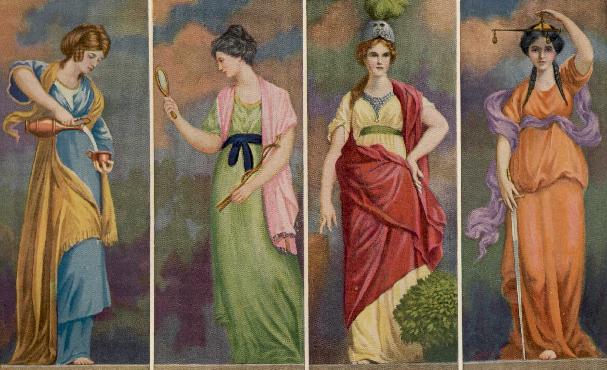the four cardinal virtues
From the Phoenixasonry Website

Temperance
Prudence
Fortitude Justice
Hand Colored Print of the Four Cardinal Virtues
This beautiful hand-colored print depicts the Four Cardinal
Virtues, the practice of which is inculcated in the First or Entered Apprentice
Degree of Freemasonry and are thus explained.
Temperance - The Freemason who properly appreciates the secrets
which he has solemnly promised never to revel, will not, by yielding to the
unrestrained call of appetite, permit reason and judgment to lose their seats,
and subject himself, by the indulgence in habits of excess, to discover that
which should be concealed, and thus merit and receive the scorn and detestation
of his Brethren. And lest any Brother should forget the danger to which he is
exposed in the unguarded hours of dissipation, the virtue of temperance
is wisely impressed upon his memory, by its reference to one of the most solemn
portions of the ceremony of initiation. Some Freemasons, very properly
condemning the vice of intemperance and abhorring its effects, have been
unwisely led to confound temperance with total abstinence in a Masonic
application, and resolutions have sometimes been proposed in Grand Lodges which
declare the use of stimulating liquors in any quantity a Masonic offense. But
the law of Freemasonry authorizes no such regulation. It leaves to every man
the indulgence of his own tastes within due limits, and demands not abstinence,
but only moderation and temperance, in anything not actually wrong.
Fortitude - instructs the worthy Freemason to bear the ills of
life with becoming resignation, "taking up arms against a sea of trouble," but,
by its intimate connection with a portion of our ceremonies, it teaches the
candidate to let no dangers shake, no pains dissolve the inviolable fidelity he
owes to the trusts reposed in him. Or, in the words of the old Prestonian
lecture, it is "a fence or security against any attack that might be made upon
him by force or otherwise, to extort from him any of our Royal Secrets."
Prudence - Preston first introduced it into the Entered
Apprentice Degree as referring to what was then, and long before had been called
the Four Principal Signs, but which are now known as the Perfect
Points of Entrance. Preston's eulogium on prudence differs from that used
in the lectures of the United States, which was composed by Webb. It is in
these words: "Prudence is the true guide to human understanding, and consists
in judging and determining with propriety what is to be said or done upon all
our occasions, what dangers we should endeavor to avoid, and how to act in all
our difficulties."
Justice - The Freemason who remembers how emphatically he has
been charged to preserve an upright position in all his dealings with mankind,
should never fail to act justly to himself, to his Brethren, and to the world.
This is the corner-stone on which alone he can expect "to erect a superstructure
alike honorable to himself and to the Fraternity." In iconology, the general
science pertaining to images, Justice is usually represented as a
matron, her eyes bandaged, holding in one hand a sword and in the other a pair
of scales at equipoise. But in Freemasonry the true symbol of Justice,
as illustrated in the First Degree, is the feet firmly planted on the ground,
and the body upright.
back to top |
![]()






